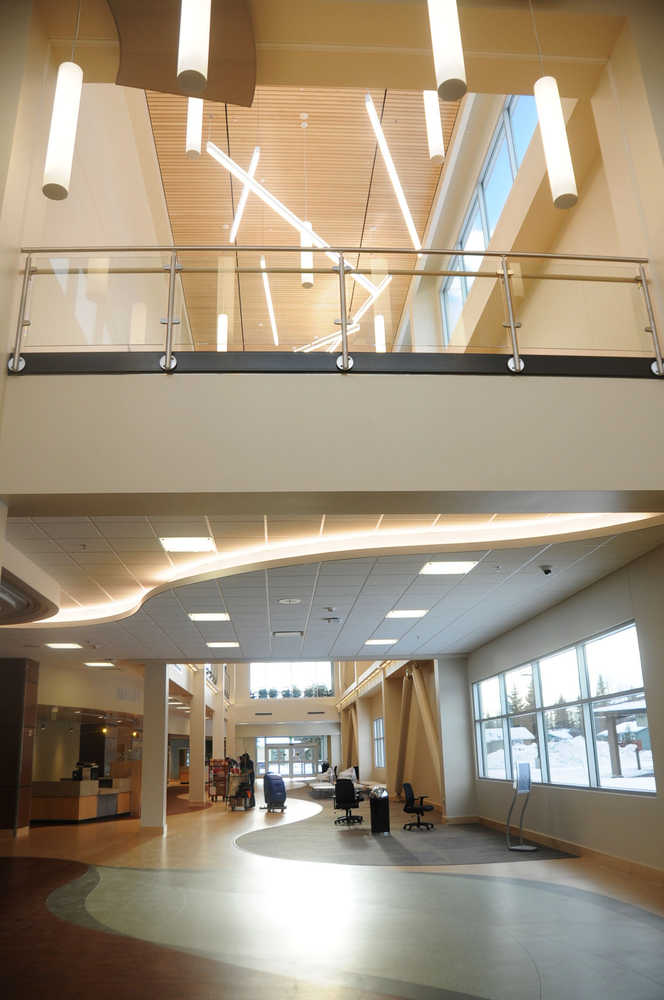Courtesy of Sunday’s 7.1 magnitude earthquake, there are cracks in the walls of Central Peninsula Hospital’s brand-new River Pavilion addition.
Fortunately, it’s mostly cosmetic damage and can be fixed with tape and paint, said Bruce Richards, the governmental and external affairs manager with the hospital.
The rest of the building seems to have escaped damage, but the cracks still irritate Richards, who has spent a long time focused on getting the building up and running. Finally, within the next month, doctors will begin moving into the space.
Cancer patients will move onto the top floor of the three-floor addition from their current space in the oldest section of the hospital. The building also has room for a medical oncologist, which the hospital hopes to attract, Richards said.
On the ground floor, Kenai Spine will move into a joint space with the hospital’s physical therapy department. The two already share a space in town, but this will place them in the hospital together, and will allow them to coordinate care more efficiently, Richards said.
“That way, it’ll be easier to say, ‘Do you really need a spine surgery?’” Richards said. “The patients are right there.”
The addition of the specialist building, which cost about $43 million, is the most recent in a string of expansions. The hospital recently announced plans to purchase a building in Soldotna to use as a transitional living facility for patients emerging from Serenity House, the drug and alcohol abuse treatment center. The expansion of the radiology department is already underway, and the operating rooms have been renovated recently.
The obstetrics department, which is in the oldest part of the hospital, would be next, ringing in at approximately $15 million to $20 million. The addition of a new tower to expand capacity is also a possibility if the Alaska LNG Project becomes a reality, said Rick Davis, CEO of Central Peninsula Hospital.
“We’re bumping up against our capacity,” Davis said.
In a presentation to the Soldotna Chamber of Commerce Tuesday, Davis discussed the hospital’s position relative to national health care reform. The hospital is behind on many of the national trends, including cost and transition to value-based reimbursement, but is working on it.
The hospital is doing well financially, enabling administrators to prepare better for “the compression,” which is when reimbursements will decrease and health care reform hits, Davis said.
“We’re under pressure, like all hospitals are,” Davis said. “We’re using our good fortune to try to get the infrastructure in place so that the community has as many services as we can that makes sense here for when that compression comes.”
In the meantime, hospital administrators are working to contain costs and make care more efficient, Davis said.
Davis said the hospital is working on improving its transparency. One requirement of the Patient Protection and Affordable Care Act is that hospitals become more open with how much procedures cost before patients have to pay for them. Central Peninsula Hospital is less expensive than many hospitals in Alaska but still more pricey than hospitals in the Lower 48.
This is a concern because some insurance providers will pay for their customers to fly to Seattle to get medical treatment rather than pay for them to stay, taking the health care business out of Alaska, he said.
One effort in tandem with Moda Health, an insurance company, is focused on a community-wide care coordination program. Essentially, the doctors in the community would be communicating with the hospital and each other about patients to make care more efficient. The hospitals — both Central Peninsula Hospital and South Peninsula Hospital in Homer — would communicate better about patients as well, he said.
Davis said he understood that some physicians may not want to participate, which is their choice, but the hospital has a responsibility to improve the health care system and make sure the services are still here for the future.
“Change is always hard,” Davis said. “The hospital doesn’t have that option. We have a fiduciary responsibility to leave the services here for the community after we’re all gone so the kids will want to stay here.”
Reach Elizabeth Earl at elizabeth.earl@peninsulaclarion.com.

